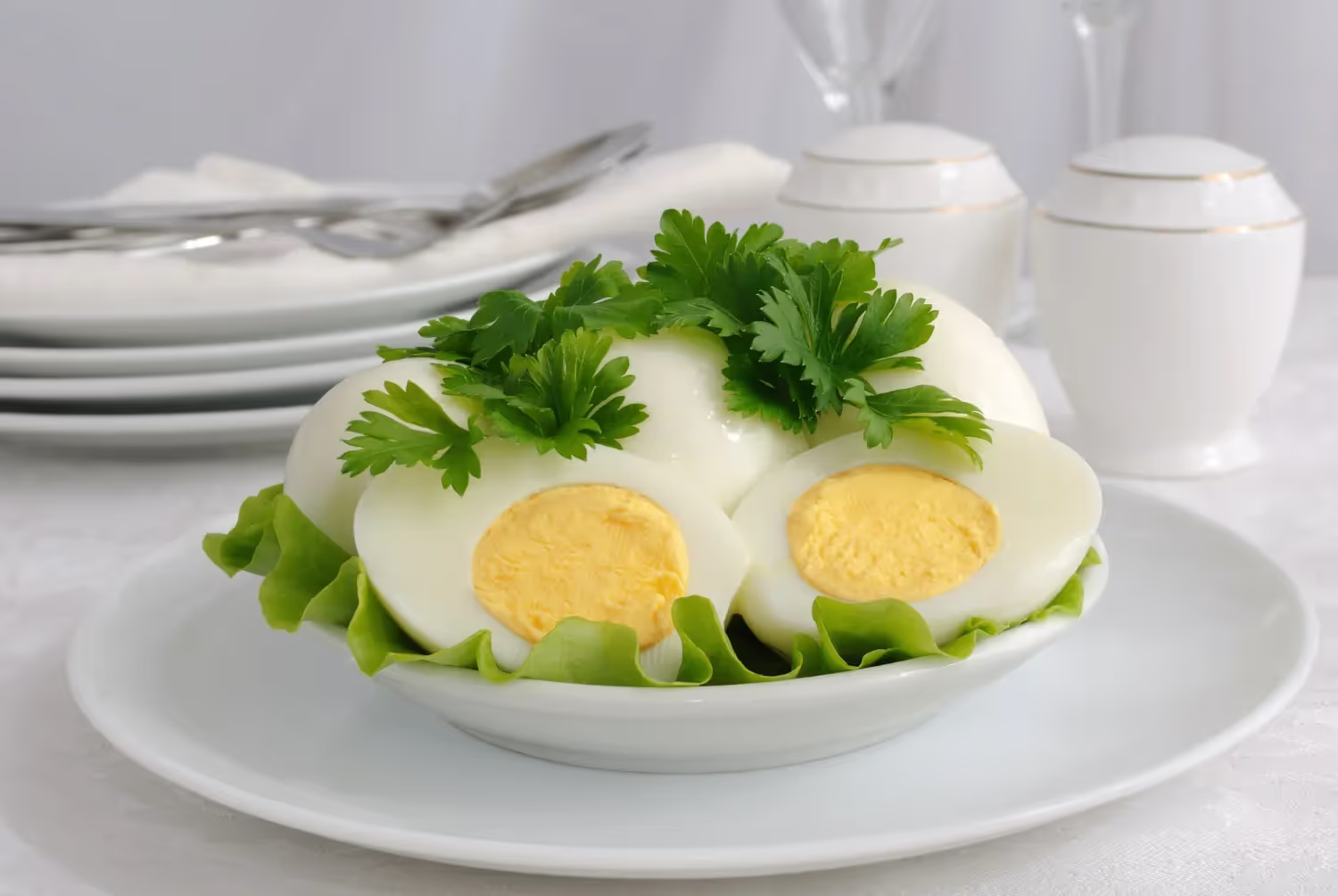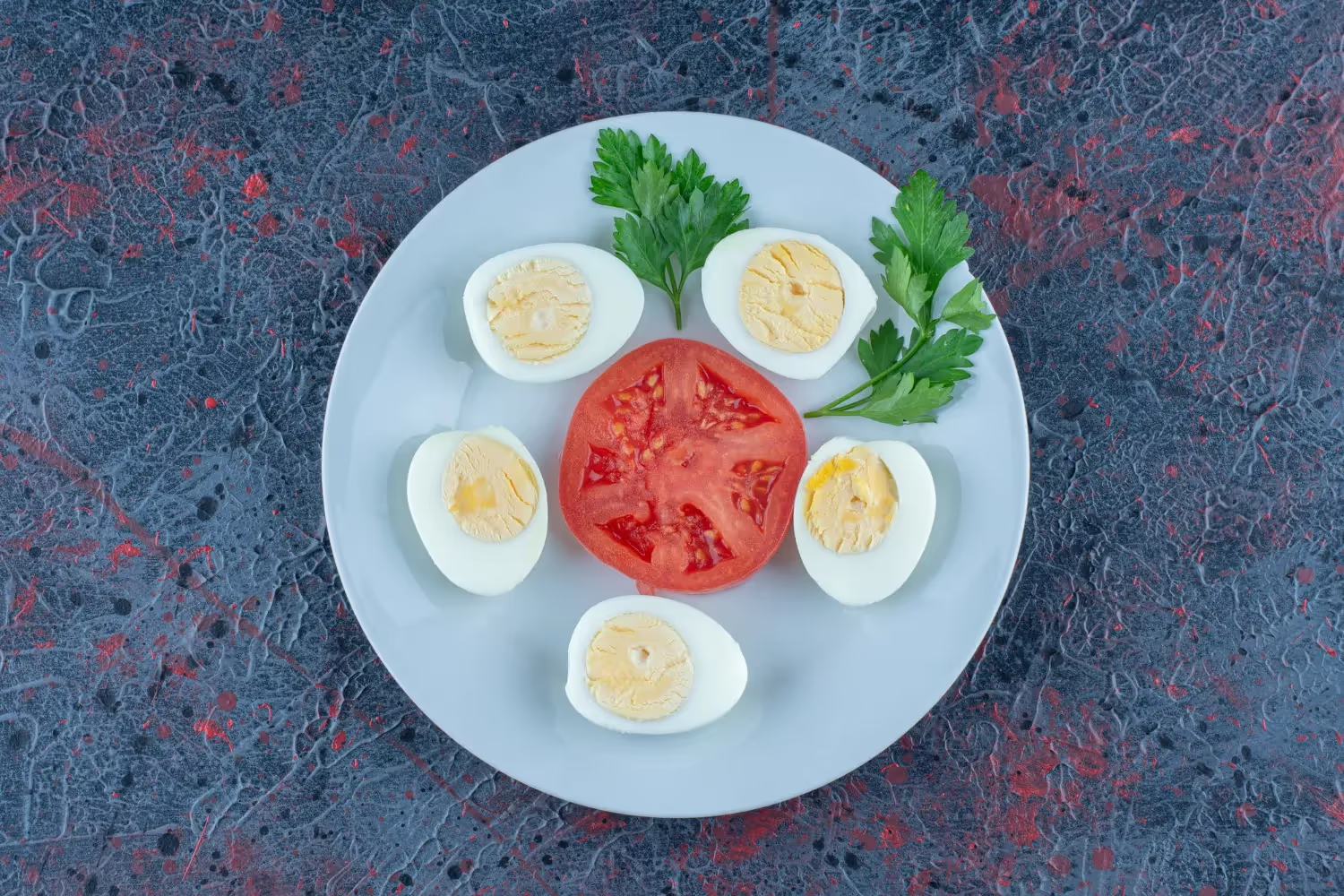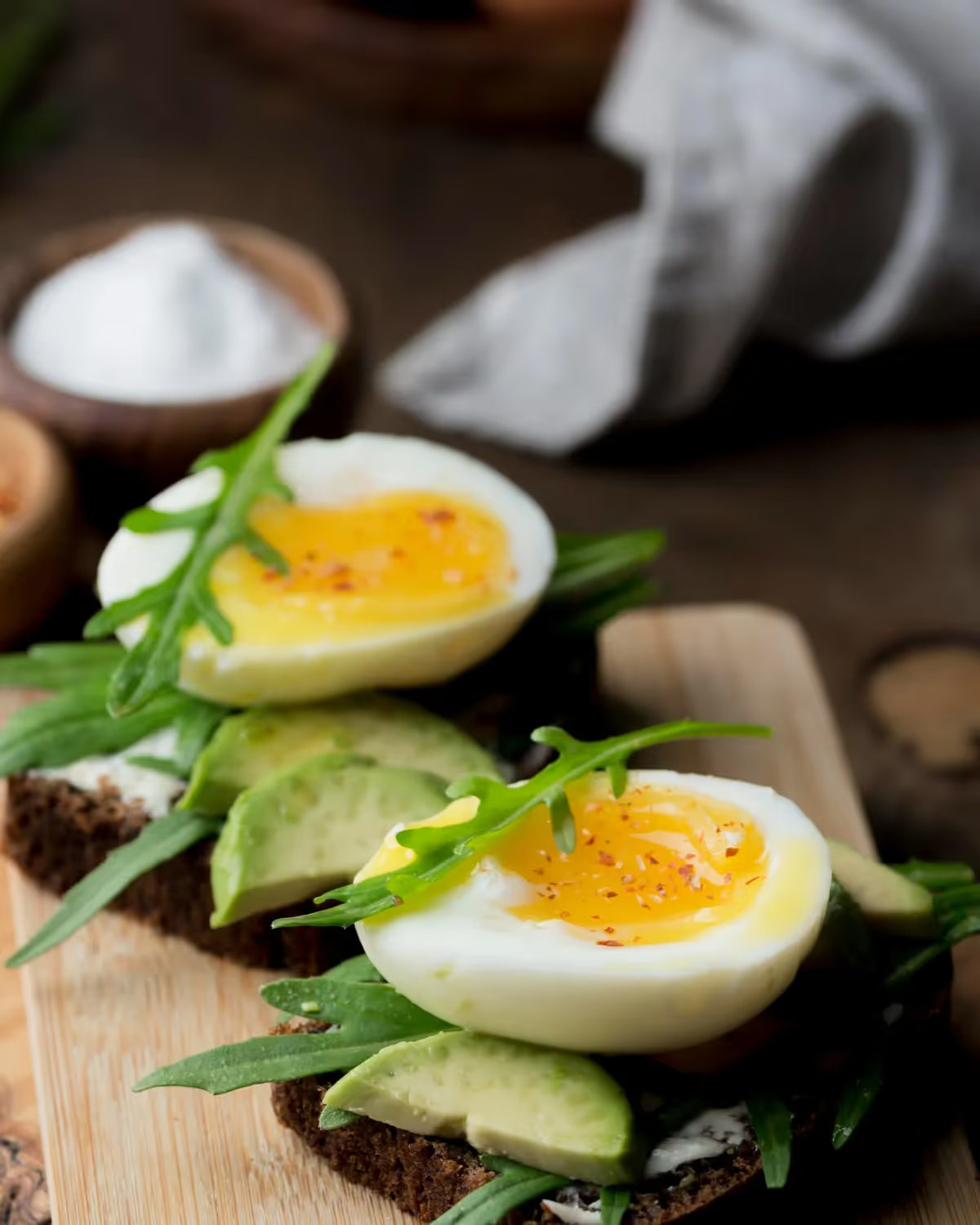Weight loss that fits your goals and your life.
Get your plan
Weight loss that fits your goals and your life.
Get your plan
The boiled egg diet centers around eating 2-3 eggs daily while limiting carbohydrates and focusing on lean proteins and non-starchy vegetables. While not a long-term solution, this 7-day reset can provide structure and quick results when approached thoughtfully, with particular attention paid to maintaining a balanced diet and promoting digestive health.
What Is the Boiled Egg Diet and Why Do Women Try It?

According to studies, eggs provide complete protein, containing all nine essential amino acids. It’s also a relatively simple diet that helps combat age-related muscle loss while supporting satiety hormones that become less responsive during hormonal transitions. The low-carb nature can also address increased insulin sensitivity.
The Nutritional Power of Boiled Eggs
One large boiled egg delivers 78 calories, 6.3 grams of protein, and 5.3 grams of fat with zero carbohydrates. But that’s not all. Eggs also contain choline, supporting neurotransmitter production for memory and mood stability during hormonal fluctuations.
They provide vitamin D for bone health, B12 for energy metabolism, and biotin for healthy hair and nails. The complete amino acid profile supports thermogenesis, helping your body burn more calories during digestion. Egg yolks contain lutein and zeaxanthin, antioxidants that protect eye health as women age.
This nutrient density makes eggs an ideal foundation for short-term calorie restriction while maintaining essential vitamin and mineral intake.
Your 7-Day Boiled Egg Diet Plan
This structured week provides approximately 800-1000 calories daily, creating a significant caloric deficit for rapid weight loss without compromising your body’s nutritional needs.
Each day includes 2-3 eggs as your primary protein source, paired with specific vegetables and occasional lean proteins. The plan progresses from stricter egg-focused days to gradually incorporating more variety.
Don’t forget to drink at least 8 glasses of water daily to support kidney function and prevent constipation from the low-fiber intake
Day 1 — High Protein and Low Carb Start
- Breakfast: 2 boiled eggs with 1 cup spinach (sautéed in 1 tsp coconut oil)
- Lunch: 3 oz grilled salmon with mixed leafy greens
- Dinner: 2 boiled eggs with steamed broccoli
Daily totals: 850 calories, 65g protein, 58g fat, 12g carbohydrates
This opening day puts your body into ketosis by restricting carbohydrate intake to under 15 grams.
According to studies, ketosis is recommended for women who want to lose weight and keep it off. However, to avoid unhealthy cravings, you need to up your protein intake and fat, which you get from coconut oil, along with medium-chain triglycerides for quick energy.
Salmon contains omega-3 fatty acids, which support hormone production and help control inflammation. The low-carb approach helps reduce water retention quickly, providing immediate visual results that motivate continued adherence.
Day 2 — Add Leafy Greens and Citrus

- Breakfast: 2 boiled eggs with 1 cup kale and half a grapefruit
- Lunch: Egg salad (3 eggs, 1 tbsp mayonnaise) over arugula
- Dinner: 4 oz grilled chicken breast with asparagus
Daily totals: 920 calories, 72g protein, 62g fat, 18g carbohydrates
Grapefruit adds vitamin C and natural enzymes that may support fat metabolism. The increased egg intake provides more choline, which supports better liver function and promotes health while you lose weight quickly. Kale delivers folate and magnesium, while the mayonnaise provides essential fats for hormone production and gallbladder health.
These are important considerations now that your digestive system is more sensitive to rapid dietary changes.
Day 3 — Eggs with Cooked Veggies and Spices
- Breakfast: 2-egg omelet with bell peppers and turmeric
- Lunch: 2 boiled eggs with cucumber slices and lemon juice
- Dinner: 3 oz lean beef with zucchini noodles
Daily totals: 880 calories, 68g protein, 56g fat, 15g carbohydrates
Turmeric provides anti-inflammatory compounds, which, according to studies, help support joint health during periods of increased physical stress, such as those associated with rapid weight loss.
Bell peppers deliver vitamin C and antioxidants while adding natural sweetness without significant carbohydrates, and lean beef provides heme iron, and the zucchini noodles satisfy pasta cravings while maintaining the low-carb structure necessary for continued ketosis.
Day 4 — Healthy Fats and Herbal Teas
- Breakfast: 2 boiled eggs with avocado slices and sea salt
- Lunch: Tuna salad (1 can tuna, 1 tbsp olive oil) with lettuce wraps
- Dinner: 2 scrambled eggs with mushrooms cooked in butter
Daily totals: 940 calories, 58g protein, 78g fat, 14g carbohydrates
Avocado provides monounsaturated fats and potassium to support heart health during rapid weight loss. The higher fat content helps maintain hormone production while keeping carbohydrate intake to a minimum.
Mushrooms provide selenium and B vitamins, while also offering a satisfying umami flavor. Herbal teas, such as chamomile or peppermint, support digestion and help reduce bloating.
Overall, the increased fat intake helps prevent gallbladder issues that can occur when trying to lose weight.
Day 5 — Egg-Based Meals With Colorful Vegetables

- Breakfast: 2 boiled eggs with cherry tomatoes and basil
- Lunch: Egg drop soup made with bone broth and scallions
- Dinner: 3 oz pork tenderloin with roasted Brussels sprouts
Daily totals: 900 calories, 64g protein, 62g fat, 20g carbohydrates
Cherry tomatoes are a low-carb source for lycopene and natural sweetness, and bone broth delivers collagen and minerals that support joint health and skin elasticity. Brussels sprouts contain sulfur compounds that support liver detoxification processes.
The slight increase in carbohydrates helps prevent metabolic slowdown while helping you stay in ketosis. Finally, satisfy your taste buds with basil and scallions, making meals feel more satisfying and sustainable.
Day 6 — Lighter Portions and Digestive Rest
- Breakfast: 1 boiled egg with cucumber slices and mint
- Lunch: 2 eggs scrambled with spinach in coconut oil
- Dinner: 3 oz white fish with steamed cauliflower
Daily totals: 780 calories, 52g protein, 54g fat, 12g carbohydrates
This lighter day allows digestive rest while maintaining protein intake for muscle preservation. Cucumber provides hydration and natural enzymes that aid digestion. Mint soothes the stomach and can help reduce bloating.
White fish, such as cod or halibut, supports your digestive system while providing lean protein. Cauliflower delivers vitamin K and fiber while remaining low in carbohydrates. The reduced calorie intake maximizes fat burning before you return to your usual eating patterns.
Day 7 — Reset Completion With Reintroduction
- Breakfast: 2 boiled eggs with mixed greens and olive oil drizzle
- Lunch: Chicken salad (3 oz chicken, 1 egg, mixed vegetables)
- Dinner: 2 eggs any style with sautéed green beans
Daily totals: 920 calories, 70g protein, 65g fat, 16g carbohydrates
For the final day, you should prepare your body for transition. Mixed greens offer folate and vitamin K, while olive oil promotes heart health and enhances nutrient absorption. Green beans add fiber and natural sweetness while remaining low in net carbohydrates.
This day maintains the metabolic benefits achieved while beginning to diversify protein sources. The combination prepares your digestive system for reintroducing previously restricted foods while maintaining the momentum of your weight loss established throughout the week.
How to Transition Off the Boiled Egg Diet

Anything abrupt or rapid isn’t good for your body, and this includes what you eat after going on our recommended 7-day boiled egg diet. You need to gradually reintroduce your usual foods to prevent metabolic shock and maintain the benefits achieved.
In the 7 days of this diet plan, your body has already adapted to high protein intake and ketosis, so sudden carbohydrate increases can cause water retention and energy crashes, among other things.
Plan a structured transition over 3-5 days, gradually increasing calorie intake by 200-300 calories per day while monitoring hunger signals. This helps preserve muscle mass and prevents the common cycle of restriction followed by overeating that you may experience.
Reintroducing Grains, Dairy, or Legumes
Start with easily digestible options, such as quinoa or steel-cut oats, rather than processed wheat products. However, we recommend adding only one new food group every other day. This lets you identify any digestive sensitivities that may have developed.
Greek yogurt is a particular favorite because it provides probiotics to restore gut bacteria after the protein-heavy week. Lentils and chickpeas offer fiber and plant-based protein, while being gentler on sensitive digestive systems than beans.
Women often experience increased food sensitivities, so this gradual approach prevents bloating, gas, or energy crashes that can leave you feeling frustrated and demotivated.
Preventing Weight Rebound
Stick to eating at least two eggs every day. This serves as a steady protein source. Eventually, start adding complex carbohydrates, such as those found in sweet potatoes or brown rice. Limit refined sugars and processed foods for the first week after the diet and focus on whole foods that provide sustained energy rather than quick glucose spikes.
Your body benefits from continued emphasis on protein to support muscle mass and metabolic rate.
To save time and avoid impulsive food choices, plan meals in advance. The goal is to preserve the metabolic improvements while creating sustainable habits that support long-term weight management and hormone balance.
Listening to Hunger and Fullness Signals
The restrictive nature of this diet can disrupt natural hunger cues. After seven days of structured eating, your body may send confusing signals about how much you should eat and when to eat. This is normal. Give yourself and your body time. To help, eat slowly and stop when you feel nearly full, not when you’re completely satisfied.
To make matters worse, hormone fluctuations during perimenopause can mask true hunger signals, making mindful eating practices essential.
Keep a food journal for the first week after the diet to track hunger levels, energy, and mood patterns. This helps you distinguish between true physiological hunger and emotional eating triggers that often intensify during midlife transitions and periods of stress.
Recap — What This 7 Day Egg Diet Can Offer
This structured approach is a great way to lose weight fast when preparing for something or when you want to start eating healthy. The high protein content is good for muscle preservation, while the simplicity eliminates decision fatigue around food choices.
However, the restrictive nature makes this unsuitable long-term. This is more of a short-term reset and isn’t sustainable by any means. The diet works best when followed by a gradual transition to healthier eating that includes diverse protein sources, healthy carbohydrates from vegetables and fruits, and adequate fiber for digestive health.
Short-Term Fat Loss With Protein Support
Research shows high-protein diets can increase thermogenesis by 20-30%, meaning your body burns more calories digesting protein compared to carbohydrates or fats. The complete amino acid profile in eggs supports muscle protein synthesis during calorie restriction.
Women lose muscle mass at 3-8% per decade, making protein intake important during any weight loss attempt. The low-carb approach depletes glycogen stores quickly, leading to immediate water weight loss of 2-5 pounds.
While not all weight loss represents fat, having a solid protein foundation helps preserve lean muscle tissue that maintains metabolic rate for continued fat burning after diet completion.
Simple, Satisfying Meals
Having a structured meal plan is often associated with lower obesity rates and a healthier body, according to studies. The meal structure eliminates the need for complex planning and portion guessing without compromising health and nutrition.
Eggs provide natural satiety through their high protein and fat content, reducing between-meal hunger that leads to snacking. The choline content supports neurotransmitter production that regulates appetite and mood stability. Women often struggle with increased cravings during hormonal fluctuations, making the structured approach all the more important.
As a bonus, you don’t have to know how to cook at all for this diet to work, making it accessible for busy women juggling work and family responsibilities. This simplicity can help establish routines that support continued healthy eating patterns beyond the seven-day period.
Caution and Customization for Women Over 40
You should avoid this diet if you have gallbladder issues because of the high fat content from eggs and added oils. It also isn’t the best diet for those taking medications for blood pressure or diabetes. If you insist, we recommend working closely with a medical expert. Rapid weight loss can and will affect your medication.
Another consideration is your digestive system. A low fiber intake may exacerbate the condition. Consider adding psyllium husk or ground flaxseed if you start to feel constipated.
The diet is also not particularly well-suited if you’re experiencing severe menopause symptoms. Studies show that low calorie intake can worsen hot flashes and mood swings.
Finally, if you have a history of eating disorders, you’ll want to avoid restrictive dietary approaches in general.
Remember, your goal is to build sustainable habits over rapid results for long-term health and weight management..
Weight loss that fits your goals and your life.
Get your plan
Sources
FAQs
Is the Boiled Egg Diet a safe or healthy choice for women over 40?
The Boiled Egg Diet is a highly restrictive, short-term plan and is not considered a balanced or sustainable approach to nutrition. For women over 40, it's crucial to prioritize maintaining muscle mass, which this very low-calorie diet can compromise. While it can produce quick results, it lacks essential nutrients from whole grains, legumes, and a variety of fruits. It is critical to consult a doctor before starting, especially if you have any pre-existing health conditions like high cholesterol or kidney issues.
How much weight can you realistically lose on the 7-day Boiled Egg Diet?
While some people report losing up to 10 pounds in a week, it's important to understand what this weight loss consists of. A significant portion is water weight shed due to the drastic cut in carbohydrates, not substantial body fat. Results will vary based on your starting weight and metabolism. Think of this as a temporary, motivational kickstart rather than a method for long-term, sustainable fat loss.
What foods are allowed on the Boiled Egg Diet besides just eggs?
While boiled eggs are the cornerstone, the diet is not exclusively eggs. To provide some nutrients, the plan typically allows for: Other Lean Proteins: Small portions of skinless chicken or fish. Non-Starchy Vegetables: Leafy greens like spinach, broccoli, zucchini, and bell peppers. Low-Sugar Fruits: Limited amounts of grapefruit, berries, or melon. It strictly eliminates all bread, pasta, sugar, processed foods, and most fruits.
What is the role of the boiled eggs in this specific diet plan?
Boiled eggs are the protein anchor of this diet. They are low in calories but very high in high-quality protein, which helps to promote a feeling of fullness (satiety). By making you feel full on fewer calories, the eggs make the extreme calorie restriction of the diet slightly more manageable. They also provide key nutrients like Vitamin D and choline.
What should I do after the 7 days to avoid gaining all the weight back?
Rebound weight gain is extremely common after a highly restrictive diet like this one. To avoid it, you must have a transition plan. Do not immediately return to your previous eating habits. Instead, slowly reintroduce healthy, complex carbohydrates (like quinoa, sweet potato, and oats) and increase your calorie intake gradually over the following week. The best strategy is to use the 7-day plan as a "reset" to then transition into a more balanced and sustainable eating pattern, such as the Mediterranean diet.







